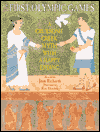Tantalus, demi-god and son of Zeus, is invited to a great feast with the gods of Olympus where he experiences the finest clothing and most exquisite food. Wanting to match the gods’ grandeur, Tantalus decides to sacrifice the thing he loves most: His Son, Pelops. He chops him up to serve him as a stew to the gods—who see what he has done. As punishment, he is sent to the Underworld where he is forever tortured with the feeling of thirst and the sight of sweet berries that he cannot reach. The gods restore Pelops, give him a horse with a chariot, and instruct him to find a kingdom. He finds one, but there is a terrible risk. Pelops must beat the King of Elis at a chariot race. If he wins, he marries the king’s daughter, Hippodamia, and inherits the kingdom. If he does not win, he loses his head! Pelops wins the race when the king’s chariot wheel falls off. The king dies. To honor the king, Pelops and Hippodamia invited all the heroes of ancient Greece to take part in athletic games and races. Pelops decreed that every four years the best men of Greece should gather in the fields of Elis for the Olympic Games.
The final pages briefly connect the myth to the modern day Olympic Games.
The final pages briefly connect the myth to the modern day Olympic Games.
Evaluation:
Let’s get the possible objectionable material out of the way first. The text of The First Olympic Games: A Gruesome Greek Myth with a Happy Ending is a bit graphic for the squeamish and the young. Unfortunately, many of the ancient stories (including some in the Bible) are disturbing. The following references are brief but potentially bothersome: Pelops being chopped up, heads being cut off/displayed at the city gate, and the king dying. The only mildly objectionable illustration is of the heads of the 12 men who attempted before Pelops to win the chariot race. There is no blood or gore. The picture just shows heads with no bodies. Though there is a reference to Pelops being chopped up, the text goes no further, and there are no illustrations to accompany it. I still recommend that parents/teachers read the text and review the illustrations to judge if it is appropriate for young readers/listeners.
Jean Richards’ narrative is based on an ancient Greek myth that precedes the King Iphitus’ story. It is well-told and interesting. This myth does reflect the violent nature of the culture and highlights the activities/interventions of the gods. Tantalus’ deed is clearly condemned. He is forced to eternal torture, a favorite consequence of the gods. Kat Thacker uses warm colors for the core action contrasting with some orangish earth tones for concurrent action on the page. The pictures offer a wonderful imaginative glimpse into the ancient Greek world. I recommend this book for ages 9 and up, but encourage adults to review it before sharing with young children.





No comments:
Post a Comment